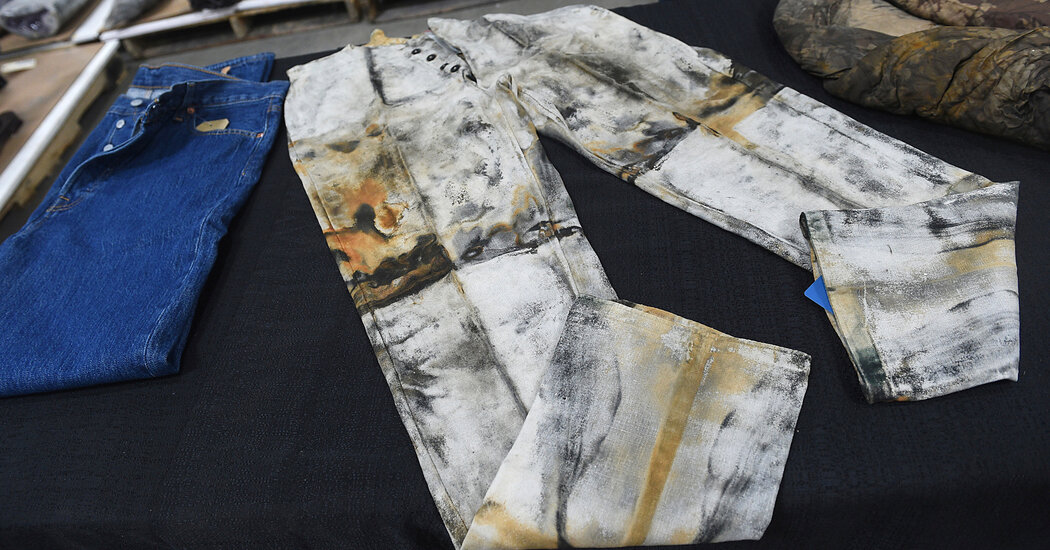A pair of work pants that sold for $114,000 at an auction this month after being pulled from an 1857 shipwreck could be an early version of Levi Strauss jeans, auction officials said, though a historian for the company said that was “speculation.”
The Holabird Western Americana Collections auction on Dec. 3 showcased 270 items recovered from the S.S. Central America, which had been traveling from Panama to New York in September 1857 when it sank in a hurricane with 425 people aboard.
The wreck was discovered in 1988 off the coast of South Carolina, and the rights to its treasures, which included thousands of pounds of California gold, have since become the subject of a decades-long legal battle.
The pants were found in a trunk belonging to John Dement, a veteran of the Mexican-American War from Oregon. Mr. Dement was a buyer for his family’s mercantile shop, and, during business trips to buy goods, survived many stormy ship journeys, including the sinking of the S.S. Central America, according to the auction catalog.
Mr. Dement’s trunk was recovered in 1991, and the items inside, which included socks, night shirts and paperback books, were salvageable because the trunk had little to no oxygen inside.
The trunk’s condition prevented its contents from exhibiting the bacterial degradation and biological consumption seen in items that were more exposed on the shipwreck, Robert Evans, the chief scientist and historian of the S.S. Central America project, said in the auction catalog.
Inside the trunk, scientists also found the work pants, which are made of a thick unknown material and covered in black and brown stains. It was not clear who made the winning bid for the pants.
Holabird Western Americana Collections said the work pants could be affiliated with Levi Strauss because he was a major seller of dry goods during the Gold Rush and lost treasure in the shipwreck. The unlabeled pants have a five-button pattern on the fly, and the buttons are “nearly identical size and manufactured style,” further convincing the sellers that the pants could be made by, or for, Strauss, the auction catalog said.
Mr. Strauss and his associate, Jacob Davis, patented the first modern bluejeans in 1873, 16 years after the S.S. Central America sank.
Tracey Panek, a historian and director of the Levi Strauss & Co. Archives, said in an email that linking the pants to Mr. Strauss was speculative.
Ms. Panek, who inspected the pants and other artifacts from the wreckage in person, said that while she was excited by the discovery, she saw nothing that would link the pants to Mr. Strauss.
“From the white color, lack of suspender buttons, five fly buttons instead of four, and the unusual fly design with extra side buttonholes, to the non-denim fabric that is a much lighter weight than cloth used by LS & Co. for its earliest riveted clothing, the Dement trunk pants are not typical of the miner’s work pants in our archives,” Ms. Panek said.
No matter the origin of the pants, at the time of the shipwreck, they would not have come close to the value of other loot on the S.S. Central America.
Passengers boarded the ship with gold coins and nuggets, which had been collected in the gold mining towns of Northern California during the Gold Rush. California’s business center at the time was in San Francisco, where passengers boarded the S.S. Sonora before transferring to the ill-fated S.S. Central America in Panama.
More than a century after the ship went down, the treasure hunter Thomas G. Thompson found the wreck. He was later accused of not providing proceeds from the haul to the 161 people who invested in his search.
Some of the investors sued Mr. Thompson in 2012, and he was ordered to appear in court and disclose the location of gold recovered from the shipwreck. He fled and became a fugitive until U.S. marshals arrested him in 2015 at a hotel in Florida. He has been in federal prison since 2015.



